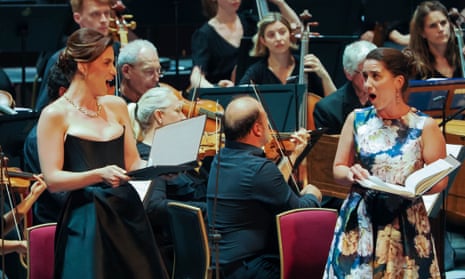Where does the strength of Allan Clayton’s tenor lie? Is it, like the biblical Samson, in his hair? Handel wrote the title role of his 1743 oratorio for his favourite tenor, John Beard, and it was a glorious showcase for classical music’s modern-day Mr Beard in the Academy of Ancient Music’s annual Prom.
Clayton seemed able to defy the Albert Hall’s tricksy acoustics, which often foxes baroque music and which indeed threw challenges at Laurence Cummings’s ensemble, further muddying a slightly messy-sounding overture. Samson’s first aria laments his blindness, and Milton’s words for this are especially moving, written by a poet who knew the pain of losing one’s sight, as Handel eventually would, too; the glow of Clayton’s voice and the contrasts he shaped here were arresting. But even these were outdone by the hushed introspection he brought to his final aria. Did the orchestra quite share Clayton’s held-breath vision here? They were perhaps a little too present; elsewhere, though, they were equal partners in the drama, with Cummings, standing at the harpsichord, keeping things going at a pace that made even this static story feel forward-moving.

Much of Samson is Handel at his best – not least the showstopping finale Let the Bright Seraphim, sung here with diamond brilliance by Joélle Harvey – even if, writing in a hurry, he borrowed a few ideas. His fellow composer Carissimi should really get a credit for the Israelites’ prayer in Act 2, its chewy harmonies sung with relish as part of an outstanding performance by the Philharmonia Chorus.
The hall was less kind to the mellower solo voices, but the singers worked hard, Jess Dandy bringing a rich, strikingly deep contralto to Micah and Jonathan Lemalu putting across the nobility of Manoa. Dalila doesn’t turn up until Act 2, but Jacquelyn Stucker’s soprano – softer-edged than Harvey’s, yet still gleaming – was worth the wait. And her exit, glaring daggers at Micah, brought a touch of humour that warmed us up for the arrival of Brindley Sherratt as Harapha, the Philistines’ belligerent champion, sung with the kind of larger-than-life bass that made it feel like someone had turned up the volume dial on the whole thing.
Available on BBC Sounds until 9 October. The Proms continue until 9 September.

Comments (…)
Sign in or create your Guardian account to join the discussion